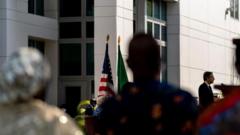Trump's shifting rhetoric and tensions with Russia lead to a chill in diplomatic engagement
Moscow Reacts to Trump's Discontent Over Russia Ties

Moscow Reacts to Trump's Discontent Over Russia Ties
Kremlin remains unfazed as U.S. President voices frustrations about relations with Putin
In the ever-changing landscape of U.S.-Russia relations, President Donald Trump's recent exasperations with the Kremlin have drawn significant attention. The dynamic nature of Trump's comments means that interpretations can quickly become outdated, as evidenced by differing headlines across Russian media. For instance, the popular Russian newspaper Komsomolskaya Pravda likened Trump's demeanor to the unpredictable nature of a weather forecast, stating: "The US president blows hot and cold," highlighting his inconsistency.
In a recent phone call on July 3 with Vladimir Putin, Trump expressed disappointment with the lack of progress in resolving the ongoing conflict in Ukraine. This aligns with the notable headline in Moskovsky Komsomolets: "The Russian-American Chill." Following this call, Trump escalated his rhetoric, threatening tariffs against BRICS nations, signaling a cooling in U.S.-Russia relations.
Trump's strong words included direct criticism of Putin during a cabinet meeting, denouncing the "bullshit" thrown at the U.S. by the Russian leader. Yet, in typical Kremlin fashion, spokesperson Dmitry Peskov downplayed the rhetoric, maintaining that they intend to continue diplomatic engagement with Washington. The Kremlin remains hopeful that the U.S. will refocus efforts on peace negotiations, even amidst Trump's complaints.
The Russian media has adopted a more critical tone towards Trump lately, contrasting sharply with the earlier, more favorable coverage. For instance, Komsomolskaya Pravda has portrayed Trump as lacking geopolitical success, while Moskovsky Komsomolets has characterized his temperament as unpredictable. Such commentary indicates an evident shift from the earlier optimism that characterized U.S.-Russia relations, where Trump's administration was seen as potentially beneficial to Moscow.
Back in March, political commentators noted an alignment of interests between the two nations, hinting at the potential for expanded cooperation. The mood seems to have changed significantly since then, with Trump's frustrations over Russia's handling of the Ukraine conflict becoming clearer.
Furthermore, the Kremlin reportedly views Trump's offers as insufficient, leading to a stance where they may prefer ongoing tensions rather than settling for an unsatisfactory peace. Current assessments suggest that Putin feels confident that he can negotiate from a strong position, which raises questions about the future trajectory of U.S.-Russia ties.
The key to future relations will depend on how Trump proceeds with military support for Ukraine and whether sanctions against Russia will be tightened. As the situation continues to evolve rapidly, observers are reminded to keep a close eye not just on Trump's comments, but also on the practical actions taken by the U.S. administration in this complex geopolitical chess match.
In a recent phone call on July 3 with Vladimir Putin, Trump expressed disappointment with the lack of progress in resolving the ongoing conflict in Ukraine. This aligns with the notable headline in Moskovsky Komsomolets: "The Russian-American Chill." Following this call, Trump escalated his rhetoric, threatening tariffs against BRICS nations, signaling a cooling in U.S.-Russia relations.
Trump's strong words included direct criticism of Putin during a cabinet meeting, denouncing the "bullshit" thrown at the U.S. by the Russian leader. Yet, in typical Kremlin fashion, spokesperson Dmitry Peskov downplayed the rhetoric, maintaining that they intend to continue diplomatic engagement with Washington. The Kremlin remains hopeful that the U.S. will refocus efforts on peace negotiations, even amidst Trump's complaints.
The Russian media has adopted a more critical tone towards Trump lately, contrasting sharply with the earlier, more favorable coverage. For instance, Komsomolskaya Pravda has portrayed Trump as lacking geopolitical success, while Moskovsky Komsomolets has characterized his temperament as unpredictable. Such commentary indicates an evident shift from the earlier optimism that characterized U.S.-Russia relations, where Trump's administration was seen as potentially beneficial to Moscow.
Back in March, political commentators noted an alignment of interests between the two nations, hinting at the potential for expanded cooperation. The mood seems to have changed significantly since then, with Trump's frustrations over Russia's handling of the Ukraine conflict becoming clearer.
Furthermore, the Kremlin reportedly views Trump's offers as insufficient, leading to a stance where they may prefer ongoing tensions rather than settling for an unsatisfactory peace. Current assessments suggest that Putin feels confident that he can negotiate from a strong position, which raises questions about the future trajectory of U.S.-Russia ties.
The key to future relations will depend on how Trump proceeds with military support for Ukraine and whether sanctions against Russia will be tightened. As the situation continues to evolve rapidly, observers are reminded to keep a close eye not just on Trump's comments, but also on the practical actions taken by the U.S. administration in this complex geopolitical chess match.




















